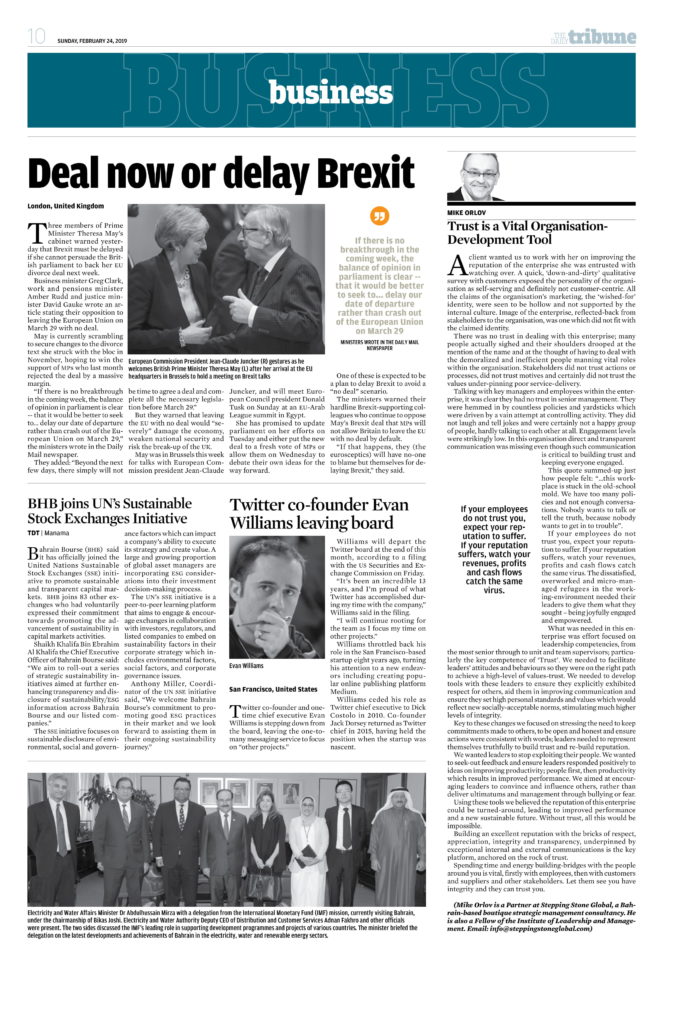
Trust is a Vital Organisation- Development Tool A client wanted us to work with her on improving the reputation of the enterprise she was entrusted with watching over. A quick, ‘down-and-dirty’ qualitative survey with customers exposed the personality of the organisation as self-serving and definitely not customer-centric. All the claims of the organisation’s marketing, the ‘wished-for’ identity, were seen to be hollow and not supported by the internal culture. Image of the enterprise, reflected-back from stakeholders to the organisation, was one which did not fit with
the claimed identity. There was no trust in dealing with this enterprise; many people actually sighed and their shoulders drooped at the mention of the name and at the thought of having to deal with the demoralized and inefficient people manning vital roles within the organisation. Stakeholders did not trust actions or processes, did not trust motives and certainly did not trust the values under-pinning poor service-delivery. Talking with key managers and employees within the enterprise, it was clear they had no trust in senior management. They were hemmed in by countless policies and yardsticks which were driven by a vain attempt at controlling activity. They did not laugh and tell jokes and were certainly not a happy group of people, hardly talking to each other at all. Engagement levels were strikingly low. In this organisation direct and transparent communication was missing even though such communication is critical to building trust and keeping everyone engaged. This quote summed-up just
how people felt: “…this workplace is stuck in the old-school
mold. We have too many policies and not enough conversations.
Nobody wants to talk or tell the truth, because nobody
wants to get in to trouble”. If your employees do not
trust you, expect your reputation to suffer. If your reputation
suffers, watch your revenues, profits and cash flows catch
the same virus. The dissatisfied, overworked and micro-managed
refugees in the working- environment needed their
leaders to give them what they sought – being joyfully engaged
and empowered. What was needed in this enterprise was effort focused on
leadership competencies, from the most senior through to unit and team supervisors; particularly the key competence of ‘Trust’. We needed to facilitate leaders’ attitudes and behaviours so they were on the right path
to achieve a high-level of values-trust. We needed to develop tools with these leaders to ensure they explicitly exhibited respect for others, aid them in improving communication and ensure they set high personal standards and values which would reflect new socially-acceptable norms, stimulating much higher levels of integrity. Key to these changes we focused on stressing the need to keep commitments made to others, to be open and honest and ensure actions were consistent with words; leaders needed to represent themselves truthfully to build trust and re-build reputation. We wanted leaders to stop exploiting their people. We wanted to seek-out feedback and ensure leaders responded positively to ideas on improving productivity; people first, then productivity which results in improved performance. We aimed at encouraging leaders to convince and influence others, rather than deliver ultimatums and management through bullying or fear. Using these tools we believed the reputation of this enterprise could be turned-around, leading to improved performance and a new sustainable future. Without trust, all this would be impossible. Building an excellent reputation with the bricks of respect, appreciation, integrity and transparency, underpinned by exceptional internal and external communications is the key platform, anchored on the rock of trust. Spending time and energy building-bridges with the people around you is vital, firstly with employees, then with customers and suppliers and other stakeholders. Let them see you have integrity and they can trust you.
